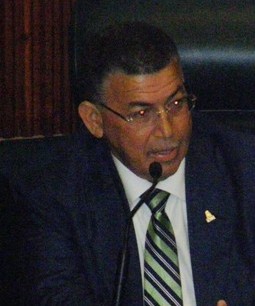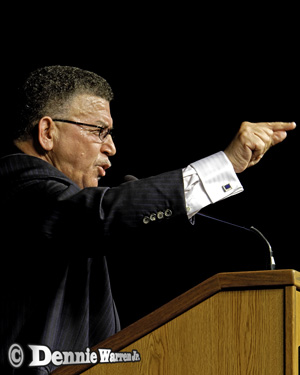Archive for December 11th, 2012

Mac arrested on theft charge
 (CNS): Premier McKeeva Bush has been arrested and is currently detained in police custody in connection with a number of on-going police investigations. Officers from the RCIPS Financial Crimes Unit (FCU) arrested Bush at around 7.00 am this morning at his home in West Bay on suspicion of theft inconnection with financial irregularities relating to the alleged misuse of a government credit card. This allegation adds to a list which includes breach of trust, abuse of office and conflict of interest, contrary to S13, S17 and S19 of the Anti-Corruption Law 2008 respectively. Allegations also include the importation of explosive substances without valid permits on or before February 2012.
(CNS): Premier McKeeva Bush has been arrested and is currently detained in police custody in connection with a number of on-going police investigations. Officers from the RCIPS Financial Crimes Unit (FCU) arrested Bush at around 7.00 am this morning at his home in West Bay on suspicion of theft inconnection with financial irregularities relating to the alleged misuse of a government credit card. This allegation adds to a list which includes breach of trust, abuse of office and conflict of interest, contrary to S13, S17 and S19 of the Anti-Corruption Law 2008 respectively. Allegations also include the importation of explosive substances without valid permits on or before February 2012.
A police spokesperson said it would be inappropriate for the RCIPS to make any further comment in relation to these matters at this time.

Cayman’s Lord rejects proposed UK ‘snooper’ bill
 (CNS): Lord Blencathra, the Cayman Islands representative in London and Conservative peer has criticized his government’s draft Communications Data Bill, which proposes to allow law enforcement agencies in Britain access to electronic data. Blencathra is the chair of a Joint Select Committee examining the legislation which has rejected the initial plans, according to reports in the UK press. The scope of plans to monitor data should be significantly decreased, he said, and indicated that major changes were required to the Bill.
(CNS): Lord Blencathra, the Cayman Islands representative in London and Conservative peer has criticized his government’s draft Communications Data Bill, which proposes to allow law enforcement agencies in Britain access to electronic data. Blencathra is the chair of a Joint Select Committee examining the legislation which has rejected the initial plans, according to reports in the UK press. The scope of plans to monitor data should be significantly decreased, he said, and indicated that major changes were required to the Bill.
"There needs to be some substantial re-writing of the Bill before it is brought before Parliament as we feel that there is a case for legislation, but only if it strikes a better balance between the needs of law enforcement and other agencies and the right to privacy," Blencathra said.
He added that there is a fine but crucial line between giving relevant agencies access to the information necessary for national security, and allowing UK citizens to go about their daily business without fear, however unjustified, that the state is monitoring their every move.
Theresa May, the UK government’s home secretary previously put forward plans which she claimed would protect against terrorism, giving police and other agencies improved powers to monitor electronic communications. However, the committee argued that May should not be given "carte blanche" to order the retention of all types of data. The committee also rejected claims that it is necessary to put in stricter measures to ensure that plans are 'future proofed'.
The Deputy PM Nick Clegg said that plans to increase powers to monitor online communications need to go "back to the drawing board".

Bush decries election change
 (CNS): Although it was his government’s choice to amend the elections law by adding two seats to George Town and one to Bodden Town, in order to meet the constitutional requirement to increase the size of the Legislative Assembly, Premier, McKeeva Bush, has said he does not support giving the capital so many votes. Speaking in Monday's debate on the eleventh hour change to the elections law ahead of the May 2013 General Election, Mr. Bush said, “I don’t support the lop-sided position of giving George Town two more members, never mind that they have got 6,000 voters,” as he pointed to the possibility of the capital’s candidates forming the next government with the support of just one other district.
(CNS): Although it was his government’s choice to amend the elections law by adding two seats to George Town and one to Bodden Town, in order to meet the constitutional requirement to increase the size of the Legislative Assembly, Premier, McKeeva Bush, has said he does not support giving the capital so many votes. Speaking in Monday's debate on the eleventh hour change to the elections law ahead of the May 2013 General Election, Mr. Bush said, “I don’t support the lop-sided position of giving George Town two more members, never mind that they have got 6,000 voters,” as he pointed to the possibility of the capital’s candidates forming the next government with the support of just one other district.
Although there were three options recommended in the Boundary Commission’s report, which was presented to the Legislative Assembly back in June 2010, Bush revealed during Monday’s last minute debate — just two days ahead of the scheduled issuing of the election writ on Wednesday by the governor — that he did not support any of them. He said the United Democratic Party had spent a considerable amount of time deciding what it should do about the increase in the parliament, but eventually decided that it had to follow the Boundary Commission’s recommendation.
He pointed to the decision to facilitate the referendum, noting that one man, one vote was a fundamental change for the Cayman Islands and he did not support putting that in the constitution at the time of the negotiations without putting it to the country first. Bush said he felt it needed to be addressed separately and the referendum result showed there was not full support. However, he acknowledged that the people did not like the idea of George Town’s voters getting such a large number of votes.
Bush railed against the opposition and said if they had wanted one man, one vote so badly they could have changed the law to facilitate it when they had a majority. The premier challenged the opposition leader’s vow to bring in single member constituencies, saying he did not believe he would ever pass one man, one vote. Bush said if the opposition was able to carry the block of six votes in George Town at the next general election, they would never want to give that up.
However, in his contribution to the debate regarding the changes to the elections procedure, the opposition leader made a clear and unequivocal promise that if the PPM was to form the next government, it would introduce one man, one vote in single member constituencies and address the numerous other identified problems with the elections law.
During the debate, North Side MLA, Ezzard Miller, again raised the potential legal problems government was setting up for itself because of the language of the constitution and the Bill of Rights, given government’s decision to allow the inequality in voting to increase.
He warned that the government could be exposed to a human rights challenge by voters who were knowingly being discriminated against, as well as other legal challenges because the elections law was unconstitutional. The constitution calls for electors to vote for “an” elected member and not several, and Miller said the premier had not taken advantage of the opportunity to address it and eliminate the risk of court room challenges.
As a result, Miller filed an amendment to change the law so that all voters just had one vote but the six candidates that received the most votes would be elected in George Town, the first four in West Bay and Bodden Town, and so on.
The attorney general told the members that ‘singular’ in drafting language could also mean ‘plural’ and vice versa, depending on the intent of the law. However, the government’s lawyer made no comment about the possibility of a human rights challenge as a result of the inequity and discrimination that the country’s voters will face across the different districts.
Miller also filed an amendment to address what he said was a growing problem in the law regarding campaign financing. He said that while candidates were allowed to spend $35,000 campaigning as an independent candidate and $30,000 per head for candidates in political parties, this only applied to the period between Nomination Day and the General Election. Potential candidates could however spend whatever they liked before Nomination Day and did not have to report it to the Elections Office. Miller said that television airtime was already getting booked and paid for, which would not be counted in the campaign finance reporting procedure and created the potential for serious imbalance in campaigns.
The independent member said the limit on spending should just apply to the entire election campaign, regardless of when it was spent.
The premier rejected both of Miller’s amendments but he said that the campaign financing allowance needed to be raised as it was not enough to cover an election.
“What we need to be doing is admitting that it costs money to finance an election and you have to spend,” he said. Bush said the law could not cover the period before Nomination Day as no one was an official candidate until then. He spoke out against the advertising rates and noted that it was very expensive to advertise on the television, radio and in the local newspaper during a campaign (although he failed to note how inexpensive advertising is on CNS).
Bush also complained about the cost of having to take down all of the signs, posters and billboards by midnight on the eve of the general election. He said this was extremely expensive because it had to be done so quickly, but thought it was a pointless exercise as it made no difference to the outcome by that time.
The amendment to the elections law was brought by Dax Basdeo in his capacity as acting deputy governor. The only amendment that was made was to allow for the two additional seats in George Town and one in Bodden Town. The government carried the vote, despite the emphatic lack of support for the amendments from both of the independent members.
Although the Elections Office has made a number of recommendations about the need for a number of other amendments to the law, no other changes were made.
Following the debate and the vote, the premier moved a motion to adjourn the House until January, when legislators will return after the Christmas and New Year holiday.